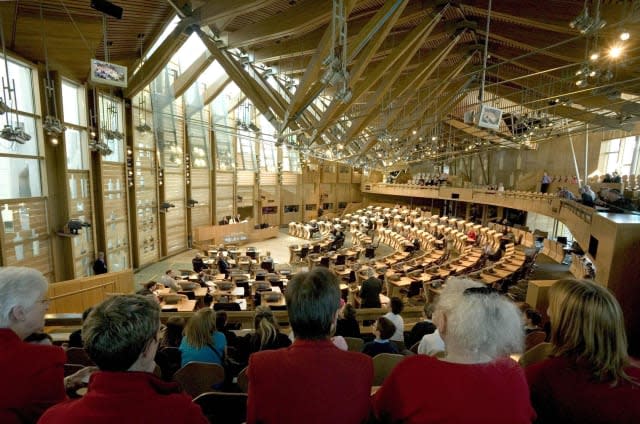20 years of the Scottish Parliament: Key legislation

As the Scottish Parliament marks its 20th year, the Press Association looks at 10 key pieces of legislation that MSPs have passed.
Mental Health (Public Safety and Appeals) (Scotland) Act 1999
Introduced in September 1999, the legislation was the first piece of legislation passed following the opening of the Parliament earlier that year.
It had aimed to close a loophole in the law which had led to the release of convicted killer Noel Ruddle, who had shot his neighbour with an assault rifle.
The Bill added public safety to the grounds for not discharging certain patients detained under the Mental Health (Scotland) Act 1984, however it was repealed in October 2005.
Ethical Standards in Public Life etc. (Scotland) Act 2000
Section 28 was scrapped by MSPs as part of this broad legislation which also set out a code of conduct for councillors.
Section 2A of the Local Government Act 1986 (more commonly referred to as Section 28) had banned the promotion of homosexuality in schools, but was lifted as part of the legislation under part 6 of the legislation which focused on the teaching and welfare of children.
Education (Graduate Endowment and Student Support) (Scotland) Act 2001
Up-front tuition fees were abolished in Scotland, after MSPs voted to replace them with an endowment fee.
The legislation meant that students would only pay a £2,289 graduate fee, with repayments starting once earnings reached £10,000.
The endowment fee was removed in February 2008 after MSPs voted to scrap the charge.
Community Care and Health (Scotland) Act 2002
In February 2002, MSPs voted unanimously in favour of plans to provide free personal care for the elderly.
The legislation meant that all personal care charges for people cared for in their own homes were abolished, while everyone needing nursing care would receive it free of charge.
Homelessness etc. (Scotland) Act 2003
Passed in 2003, the legislation placed a duty on councils to provide temporary accommodation, advice and assistance to homeless people.
The Scottish Government at the time pledged that by 2012, 100% of homelessness applications in Scotland would be determined to be in priority need.
In 2012, the legislation was changed, entitling anyone finding themselves homeless through no fault of their own to settled accommodation.

The Smoking, Health and Social Care (Scotland) Act 2005
A ban on smoking in bars, restaurants and all public places was approved by MSPs in June 2005, with the change coming into effect in March 2006.
Employers could be fined if they failed to enforce the ban and smokers could also face a fine if they were found to be lighting up.
The then Health Minister, Scottish Labour MSP Andy Kerr, described it as being the most important piece of public health legislation in a generation.
Alcohol (Minimum Pricing) (Scotland) Act 2012
Scotland became the first place in the UK to introduce minimum drink pricing after MSPs voted to back changes to pricing in 2012.
The move meant that alcohol would be priced at 50p per unit, with the hope of tackling historical alcohol abuse problems in the country.
However, the legislation faced a long delay in being introduced after it became tied up in legal challenges.
It was eventually brought in in May 2018 after the UK Supreme Court ruled that the legislation was not in breach of European Union law.
Scottish Independence Referendum Act 2013
The legislation which paved the way for Scotland to hold a referendum on independence was passed by MSPs in November 2013 and set out a series of rules for the referendum, such as the question and campaign spending limits.
Separate legislation allowing 16 and 17-year-olds to vote in the referendum had already been passed.
The referendum was held in September 2014, with a turnout of 84.59% – a record high for any election held in the United Kingdom since the introduction of universal suffrage in 1918.
Marriage and Civil Partnership (Scotland) Act 2014
MSPs backed a bill which would allow same-sex weddings to take place in Scotland, in November 2013, passing in February 2014.
The Scottish Government said at the time that the move was the right thing to do, despite Scotland’s two main churches being opposed to it.
The law came into effect in Scotland on December 16 that year, with some of the first marriages taking place on Hogmanay after the usual 15-day notice period for marriages.
Domestic Abuse (Scotland) Act 2018
The Scottish Parliament voted by 118 to one to bring changes to laws over domestic abuse in Scotland.
Under the legislation, a specific offence of “abusive behaviour in relation to a partner or ex-partner” was created, widening the scope for prosecution, having previously primarily focused on domestic abuse of a physical nature.
Scottish Conservative MSP Margaret Mitchell, who had recorded the only vote against the legislation, later explained that she had pressed the wrong button during the vote and that she was, in fact, in favour of the changes.


